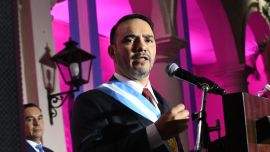Constructed by Cristina Fernández de Kirchner as the Peronist electoral machine for 2019, Frente de Todos is no more – from here on the Peronist coalition seeking a further 2023-2027 term in office is to be called "Unión por la Patria” (“Union for the Homeland”), a tag designed to help overcome internal divisions in the final countdown to election day.
Following the expiry of the deadline for judicial registration of electoral pacts on midnight Wednesday, seven such alliances will be competing in the PASO (Primarias Abiertas, Simultáneas y Obligatorias) primaries on August 13, pending a review of documentation by Electoral Nacional Court Judge María Servini de Cubría.
According to judicial sources, the following seven fronts have requested the right to compete in the PASO primaries: Juntos por el Cambio (centre-right), Unión por la Patria (formerly Frente de Todos), Frente de Izquierda y de Trabajadores – Unidad (leftist) and Javier Milei’s La Libertad Avanza (libertarians) are the main groupings, while Hacemos por Nuestro País (non-Kirchnerite Peronists), Principios y Valores (nominating former domestic trade secretary Guillermo Moreno for the presidency) and Frente Liberar have also been registered.
Union for the Homeland
The ruling coalition’s new brand name was improvised almost at the last minute on Wednesday, according to reports, as party heavyweights including Cristina and Máximo Kirchner, Daniel Scioli and Sergio Massa worked out their differences in order to meet the regulatory conditions.
The new name was quickly agreed with far more discussion over the percentage required for PASO primary runners-up to also place candidates on the lists for Congress. This was finally set at 30 percent, Noticias Argentinas reported, after Máximo Kirchner had pushed for a high bar of 40 percent. He finally settled for the 30-percent floor but not before issuing a harsh communiqué slamming both Scioli and President Alberto Fernández. The national lawmaker criticised Scioli, a presidential hopeful, for threatening to take any differences over that figure to court, something which could allegedly harm the sector given the "manifest hostility and persecution" where Kirchnerism is concerned.
Agreement was also reached over a rule whereby each sector presents its own lists in every jurisdiction without crossovers or shared candidates. Thus Scioli would be unable to link his presidential ticket to the gubernatorial slate of Buenos Aires Province Governor Axel Kicillof apparently seeking re-election (an ambition yet to be confirmed) and topping all opinion polls.
Apart from the change in the umbrella name, the political parties featuring in the ruling coalition are practically the same as in 2019 and 2021: the Partido Justicialista (the traditional mainstream Peronist party), Frente Renovador, Kolina, Nuevo Encuentro, Partido de la Victoria, Frente Grande, the Communist Party and Partido Solidario, among others.
As of midnight on Wednesday, the electoral fronts had just 10 days to sort out the most complicated and turbulent part – defining the lists of candidates, including the presidential ticket. These will be subject to judicial review as from next Saturday.
Until now the Kirchnerites and the followers of Frente Renovador leader Sergio Massa have been unable to resolve their presidential ticket that will confront Scioli in the primaries, with Cabinet Chief Agustín Rossi and social leader Juan Grabois other possible hopefuls.
Massa has passed from blanket opposition to internal competition within the PASO primaries to a more open mind while another prospect is Interior Minister Eduardo ‘Wado’ De Pedro, who has been campaigning the most actively in that direction and is close to Fernández de Kirchner.
Finally, it has not been ruled out that the vice-president could ask or order Kicillof to abandon his re-election ambitions for a presidential candidacy.
Opposition on brand
The leading parties in Argentina’s main opposition Juntos por el Cambio coalition – PRO, the Radicals and Coalición Cívica – confirmed Wednesday that a number of parties were joining their alliance: Avanza Libertad under José Luis Espert, GEN under Margarita Stolbizer, the Partido Demócrata Progresista; the Partido Unión Popular; the Partido Unir under Alberto Asseff (close to Patricia Bullrich) and the Movimiento de Integración y Desarrollo (MID, the party of Buenos Aires City Mayor Horacio Rodríguez Larreta’s father) as part of their coalition. Since Miguel Ángel Pichetto became Mauricio Macri’s running-mate in 2019, his Peronist followers in Encuentro Republicano Federal have also been considered a core element of the alliance.
Tensions soared last week, however, over the potential recruiting of Córdoba Province’s Peronist Governor Juan Schiaretti, an initiative that was headed by PRO presidential hopeful Rodríguez Larreta with support from Jujuy Radical Governor Gerardo Morales, Pichetto and Espert, among others.
A meeting this week aimed at defining the floors for minorities to place candidates on lists where primaries are contested, establishing it at 20 percent.
Barred from entry into Juntos por el Cambio, Schiaretti has now registered his own alliance anchored on non-Kirchnerite Peronism, named "Hacemos por Nuestro País." It consists of the Socialist, Christian Democrat and Autonomist parties, along with some provincial groupings.
Stick to the rules
Some users online reacted sharply to the ruling coalition’s name change, but the law governing political parties lays down certain parameters for nomenclature. Article 16 stipulates that “the name may not contain personal designations or their derivatives nor the expressions “Argentine,” “national," "international,” nor their derivatives nor anything which might affect international relations nor words expressing racial, class or religious antagonisms nor anything provoking them.”
In addition, the name “must be reasonably and clearly distinguished from the name of any other party or association. Any splinter group has no right to employ either totally or partially the original name of the party nor add to them.”
Any party or alliance presenting itself in the PASO primaries must obtain at least 1.5 percent of valid votes to progress to the general elections on October 22. This threshold applies to all levels of voting from the presidential and Congress through to the Mercosur parliament.
– TIMES/NA/PERFIL




















Comments